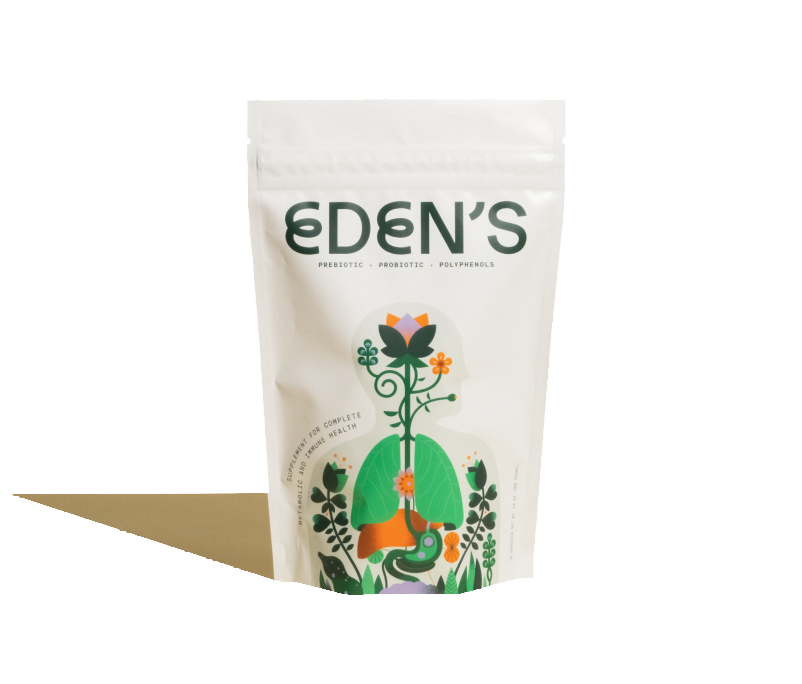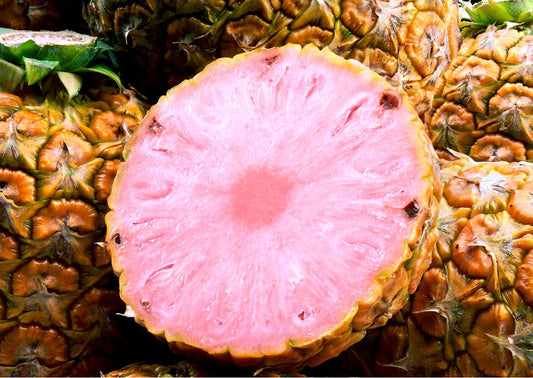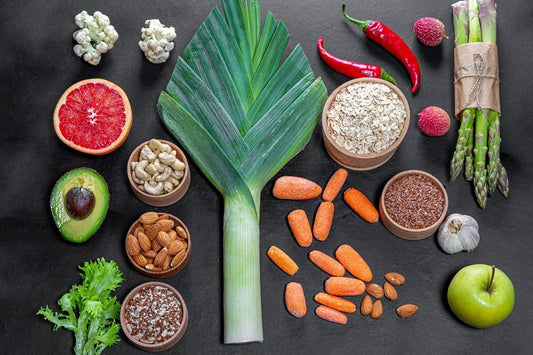Nutrition

Polyphenols are phytochemicals, or micronutrient compounds, found in many plant food sources such as fruits and vegetables. But what are the health benefits of polyphenols?
They are a wide number of health benefits associated with polyphenols, including reducing and preventing free-radical activity in the body and stunting and preventing the development of cancer cells. But another, well-studied link between polyphenol consumption and health is in the cardiovascular realm.
Polyphenols are linked to improved cholesterol levels, improved blood pressure, reduced inflammation, and improved gut health — all of which ultimately support heart health. Polyphenols can be great additions to one's daily diet, either in the form of natural foods or a polyphenol supplement, such as Eden's 3-in-1 Synbiotic Supplement — a superblend of polyphenols, prebiotics and probiotics that improves gut and heart health, aids in energy management, and improves sleep.
Different types of polyphenols
Currently, there are over 8,000 different polyphenols, which have been categorized into four main classes: each class is distinguished by the strength of the polyphenol's phenolic ring (the fundamental molecule that all polyphenols share). As we’ve covered in our comprehensive guide to polyphenols, Polyphenols 101: Your ultimate guide to polyphenols, the four most common classes of polyphenols are:
- Flavonoids
- Stilbenes
- Lignans
- Phenolic acids
Flavonoids and phenolic acids are both umbrellas of smaller sub-groups. Flavonoids are categorized into six subclasses: flavonols, flavanones, flavanols, flavones, anthocyanins and isoflavones. Phenolic acids are divided into two subclasses: derivatives of benzoic acid and derivatives of cinnamic acid.
While polyphenols can seem complex and foreign, you may have actually heard of some of the more well-known polyphenols and their associated health benefits. For example, resveratrol — a well-known polyphenol found in grapes and, subsequently, wine — has antioxidant properties that support brain and heart health. Similarly, catechins, found abundantly in tea, helps protect the body against free radicals, reducing the risk of cancer and other diseases. We discuss more polyphenol health benefits in this next section.
The heart health benefits of polyphenols
Heart health is measured by the absence of cardiovascular disease, which covers a range of conditions affecting the heart and blood vessels. Heart health is influenced by obvious factors such as sleep, exercise, and diet; and then, the less-obvious ones, such as gut health, which in part is mediated by nutrients found in food (including prebiotics, probiotics, and polyphenols). This section covers the health benefits of polyphenols that specifically improve heart function.
It starts in the gut
A healthy gut simply indicates a well-functioning digestive system and its ability to break down foods for nutrient absorption and energy. Poor gut health, caused by poor diets (such as ones high in saturated fats or sugar), is linked to the development of cardiovascular diseases, as we detailed in our guide: How does the gut affect heart health?
Polyphenols and gut health have a symbiotic relationship, meaning polyphenols benefit gut health, while a healthy gut helps the body best utilize polyphenols. Foods high in polyphenols benefit and positively alter the gut microbiome by increasing beneficial bacteria and decreasing harmful or pathogenic bacteria in the gut.
If certain foods can negatively impact the gut microbiome, how can we reverse-engineer a healthy gut to improve heart health? One way to do so is by consuming foods high in polyphenols, or by taking polyphenol supplements, such as Eden's.
Polyphenols and cholesterol
One particularly important marker of heart health is cholesterol, which is found in your bloodstream and in certain foods you eat. A high total cholesterol level (with high levels of low-density lipoproteins, or LDL-C, which is the harmful kind of cholesterol), manifests as accumulated fatty deposits in your blood, which increase blockages in the blood vessels and can eventually lead to heart attack or stroke, or more serious heart diseases.
Fortunately, research suggests that polyphenols have beneficial effects on cholesterol levels. One recent animal study found that feeding a polyphenol-rich extract from the Perilla frutescens leaf (which belongs to the mint family) to rats fed a high-fat diet significantly lowered total cholesterol levels, LDL-C levels, and triglyceride levels, while improving HDL-C levels (the beneficial kind of cholesterol). The higher the extract dosage, the more dramatic the impact on cholesterol levels. In a 2021 review of dietary polyphenols, data showed that green tea decreased plasma LDL-C levels by 40%, kombucha decreased plasma LDL-C levels by 36%, raspberry juice decreased plasma LDL-C levels by 41%, and kiwifruit decreased plasma LDL-C levels by 41%.
Thus, by improving levels of beneficial HDL-C and decreasing levels of LDL-C, polyphenols appear to help modulate the amount of cholesterol flowing through your blood, which may lower your risk of developing heart disease. However, researchers caution that further clinical studies are required to elucidate how polyphenols work, to separate and identify the active components in the presence of crude extracts (to provide more useful dietary references for people), and to better compare the effect of polyphenols and their metabolites on lowering LDL-C.
Polyphenols and inflammation
Inflammation is the body's natural protective response against potentially harmful agents in the body (such as bacteria or viruses) or to injury. Short-term inflammation is actually beneficial and necessary for the body's healing process, whereas long-term (or chronic) inflammation is harmful. While there is no evidence that inflammation directly causes cardiovascular diseases, there is a strong correlation between chronic inflammation and the incidence of heart disease and stroke. The exact mechanisms behind this correlation have yet to be determined.
Many leading health professionals believe that the body's inflammatory response to high cholesterol levels in the blood, a recognized factor for heart disease and stroke, contributes to the prevalence of cardiovascular conditions. The body's inflammatory cells perceive cholesterol plaques (due to excess cholesterol in the blood) as foreign and potentially harmful to the body. These cells then work to close off the plaque from blood flow. However, if and when plaques rupture, they form blood clots that may bring on a stroke or heart disease. Reducing harmful inflammation can benefit heart health by reducing the risk of developing common cardiovascular conditions.
One way to regulate the body's inflammation levels is to consume diet rich in polyphenols to benefit from their anti-inflammatory properties. Polyphenols help fight harmful inflammation by interfering with enzymatic processes associated with inflammatory responses, regulating gene expression, and scavenging the body for excess reactive oxygen species (ROS) that can lead to inflammation. For example, epicatechin gallate (EGCG), a green tea polyphenolic compound also found in Eden’s 3-in-1 supplement, has been found to protect endothelial cells (the lining of cells found inside your blood and lymphatic vessels) from inflammation. EGCG also protects against and reduces oxidative stress, which can lead to inflammation.
Foods rich in polyphenols
Polyphenols exist naturally in many plant foods — including fruits, vegetables, herbs, tea, and nuts. However, the polyphenol content found in these foods will range, depending on the growing and harvesting conditions: the climate they’re grown in, how much light they get, what time of the year they’re grown and then harvested, and how the food is stored. Foods also vary in types of polyphenols and their beneficial properties. Compiled below are a list of foods that are rich in polyphenols, particularly ones that benefit heart health.
Fruits
The fruits with the highest polyphenol contents and that contain essential cardioprotective polyphenols tend to be berries and citrus fruits. Berries have high polyphenol contents per serving. The estimated polyphenol content per 100 mg of common berries are:
- Blueberries: 548 mg
- Strawberries: 422 mg
- Raspberries: 482 mg
- Blackberries: 507 mg
Berries also contain anthocyanins (a polyphenol antioxidant found in red, purple, and blue fruits and vegetables), which contribute to greater heart health by reducing inflammation, blood pressure, and cholesterol levels.
Citrus fruits contain hesperidin, a polyphenol associated with reduced inflammation and reduced systolic blood pressure and pulse pressure, protecting the health of your blood vessels.
While certain fruits may be higher in polyphenol content and contain more cardioprotective polyphenols than others, in general it’s just advisable to eat more total fruits (and vegetables) overall.
Vegetables
While vegetables don't have as many polyphenols as fruits, they are still a great source of natural polyphenols. In particular, vegetables such as kale, broccoli, and spinach are rich in quercetin and kaempferol, two polyphenols that are associated with improved heart health.
-
Quercetin contributes to the color of many fruits and vegetables. It also reduces inflammation in the body and has an antiaggregant effect on platelets; meaning, it prevents excessive clumping of platelets in the blood that can cause cardiovascular disorders.
- Kaempferol is a flavonol with anti-inflammatory properties. Studies have found that consuming a minimum of 1.5 mg of kaempferol per day could lower the risk of dying from coronary heart disease.
The quercetin (Q) and kaempferol (K) content per 100 grams of fresh kale, broccoli, and spinach are listed below:
Kale: 22.6 mg (Q), 47.0 mg (K)
Broccoli: 13.7 mg (Q), 7.2 mg (K)
Spinach: 27.2 mg (Q), 55.0 (K)
Nuts and seeds
Research has found that long-term and higher intake of lignans (a class of polyphenols) effectively reduces the risk of developing coronary heart disease. Lignans help improve cardiovascular markers by lowering blood pressure and cholesterol. Among the foods rich in lignans (approximate amounts) are:
- Flaxseed - 294.21 mg of lignans per 100 g
- Cashew nuts - 56.33 mg of lignans per 100 g
- Sesame seeds - 252 mg of lignans per 100 g
Herbs
Some of the top herbs with cardioprotective polyphenols include cinnamon, turmeric, ginger, coriander, cloves, and peppermint.
- Cinnamon contains coumarin, a polyphenol that has anti-inflammatory, anti-coagulant, and antihypertensive properties.
- Turmeric contains curcumin, an anti-inflammatory polyphenol that may also reduce blood clotting.
- Fresh ginger contains a polyphenol called gingerol, which reduces inflammation and free radical activity in the body.
- Coriander contains gallic acid and ferulic acid, both of which have antioxidant and anti-inflammatory properties. In addition to these benefits, ferulic acid has also been shown to reduce blood pressure and ventricle stiffness in an animal study.
- Cloves contain quercetin and kaempferol, which help reduce inflammation in the body and prevent platelet aggregation.
- Peppermint contains hesperidin, a polyphenol also found abundantly in citrus fruits, that reduces inflammation and oxidative stress and reduces blood pressure.
Beverages
Drink products are also great natural sources of polyphenols that can benefit heart health.
-
Tea: Contains catechins, which are also anti-inflammatory and preventative of oxidative stress, certain cancers, and neurodegenerative disease.
-
Coffee: Contains chlorogenic acid and trigonelline, both of which exhibit cardioprotective effects. Consumption of chlorogenic acid is associated with a reduced risk of hypertension, heart failure, atherosclerosis, and other cardiovascular conditions. Trigonelline improves cholesterols levels and reduces platelet aggregation, which, in excess, can lead to heart damage or strokes. What may surprise many people is that coffee has a higher polyphenol content than those of different teas and wines. Coffee contains 214 mg of polyphenols per 100 ml, whereas black tea and green tea contain 102 mg and 89 mg per 100 ml, respectively.
- Wine: The resveratrol in wine is a polyphenol that is anti-inflammatory and beneficial for cholesterol, as well as for overall brain and heart health. Red wine, at 101 mg of polyphenols per 100 ml, sits in between black and green tea for polyphenol content. On the other hand, white wine and rosé wine contain the least amount of polyphenols (10 mg per 100 ml) of all wines, due to the lack of grape skin used in the winemaking process. Grape skin is what gives red wine that rich color, and it is also where the majority of polyphenols in grapes are found. Then again, do the benefits from the polyphenols in red wine outweigh the health negatives associated with the alcohol component? That controversy rages on, and it’s now considered highly dubious that red wine consumption is “beneficial” just because of the polyphenols.
Polyphenol supplements
Aside from natural foods, polyphenols are also widely available via polyphenol supplements, created by careful extraction of polyphenols from natural sources (so as to retain as much nutritional value as possible). Oftentimes, polyphenol supplements contain a blend of extracts from various superfoods to boost the health benefits of the supplement exponentially.
Eden's 3-in-1 Synbiotic Supplement is a blend of prebiotics, probiotics, and high-quality polyphenols sourced from gold and green kiwifruit, lychee and green tea (oligonol), and turmeric — all of which have cardioprotective effects. Regarding the polyphenols:
- Oligonol, a polyphenol extract sourced from lychee and green tea, improves blood flow circulation throughout the body, as well as reduces inflammation — which in turn reduces the risk of developing heart disease or other cardiovascular conditions. Green tea polyphenols have also been found to lower the amount of Firmicutes and Bacteroidetes in the gut microbiota, lowering the overall Firmicutes/Bacteroidetes ratio — which has, in some cases, been associated with overweight or obese profiles, a recognized risk factor for cardiovascular disease. One meta-analysis of various studies on epicatechin gallate (EGCG), the primary catechin found in green tea, revealed that even at a low dose of 300 mg per day, EGCG could increase metabolic rate (the number of calories your body burns at rest), which leads to greater total calories burned and improved weight management, benefiting heart health. EGCG also aids in fat oxidation, the process of using and breaking down stored fats for energy, which contributes to weight loss and improved heart health. (However, the role that polyphenols play in weight management is best complemented by a comprehensive weight loss plan that includes food, diet, and exercise.)
- Curcumin, found in turmeric, potentially reduces blood clotting and provides anti-inflammatory effects, both of which support greater cardiovascular health.
- Polyphenols sourced from gold and green kiwifruit are also anti-inflammatory, protecting the cardiovascular system against disease. In addition, gold and green kiwifruit polyphenols support gut health, which in turn benefits heart health.
Learn more about the science behind each of Eden's carefully selected ingredients and how they work synergistically to provide you with a healthier gut, improved sleep, and more energy to go about your day.
Key takeaways
Polyphenols are natural compounds found in many plant food sources — including herbs, fruits, vegetables, nuts, and seeds. There are over 8,000 different polyphenols currently identified, and they are commonly categorized into four main classes: flavonoids, stilbenes, lignans, and phenolic acids. Many polyphenols have antioxidant and anti-inflammatory properties, which are cardioprotective in nature. As for the health benedfits of polyphenols, some polyphenols, such as quercetin or hesperidin, are particularly beneficial for heart health because they improve cardiovascular markers, including cholesterol, blood pressure, and blood clotting. To incorporate more polyphenols in your daily diet, consume more polyphenol-rich foods, such as the ones listed in this guide, or make it easy for yourself and take a polyphenol supplement, such as Eden's 3-in-1, and enjoy a convenient solution to improving gut and heart health.



